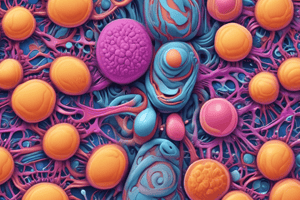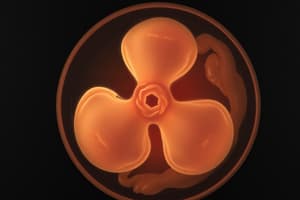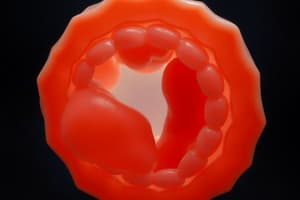Podcast
Questions and Answers
Quelle phase de l'organogenèse implique les cellules subissant des changements en fonction des interactions dans leur environnement?
Quelle phase de l'organogenèse implique les cellules subissant des changements en fonction des interactions dans leur environnement?
- Différenciation
- Induction (correct)
- Fécondation
- Morphogenèse
Quel processus de formation d'organes implique le maintien de leur structure de base par des mécanismes internes?
Quel processus de formation d'organes implique le maintien de leur structure de base par des mécanismes internes?
- Morphogenèse (correct)
- Différenciation
- Induction
- Fécondation
À quel moment approximatif commence la formation du tube neural lors du développement embryonnaire?
À quel moment approximatif commence la formation du tube neural lors du développement embryonnaire?
- Sept semaines après la conception
- Cinq semaines après la conception
- Deux semaines après la conception
- Quatre semaines après la conception (correct)
Quel est le résultat de la différentiation lors de l'organogenèse?
Quel est le résultat de la différentiation lors de l'organogenèse?
Quelle couche embryonnaire forme le tube neural pendant le développement embryonnaire?
Quelle couche embryonnaire forme le tube neural pendant le développement embryonnaire?
Quelle phase de l'organogenèse est essentielle pour le bon fonctionnement et l'entretien des organes tout au long de la vie?
Quelle phase de l'organogenèse est essentielle pour le bon fonctionnement et l'entretien des organes tout au long de la vie?
Quelle étape marque la transition entre le stade pré-organique et l'organogenèse lors du développement embryonnaire?
Quelle étape marque la transition entre le stade pré-organique et l'organogenèse lors du développement embryonnaire?
Quel processus crée un espace creux à l'intérieur de l'embryon durant la gastrulation?
Quel processus crée un espace creux à l'intérieur de l'embryon durant la gastrulation?
Quelle est la principale caractéristique de l'organogenèse lors du développement embryonnaire?
Quelle est la principale caractéristique de l'organogenèse lors du développement embryonnaire?
Quel est le rôle de l'ingression pendant la gastrulation?
Quel est le rôle de l'ingression pendant la gastrulation?
Quelle phase du développement embryonnaire se produit vers le douzième jour après la fécondation?
Quelle phase du développement embryonnaire se produit vers le douzième jour après la fécondation?
Quel événement forme une série de couches - ectoderme, mésoderme et endoderme - pendant la gastrulation?
Quel événement forme une série de couches - ectoderme, mésoderme et endoderme - pendant la gastrulation?
Flashcards are hidden until you start studying
Study Notes
Embryology
Embryology is the branch of biology that studies the development of multicellular organisms from fertilized egg to birth. It involves understanding the processes by which cells develop into complex structures during the life cycle of living organisms. This science is also crucial in medicine since it associates normal development with what can go wrong in ways that have practical treatments.
Organogenesis
Organogenesis refers to the process of organ formation in an embryo. During this time, the body's organs start their development in three distinct stages: induction, morphogenesis, and differentiation. Induction occurs when cells undergo changes based on interactions within their environment. Morphogenesis is the process of organs taking shape while maintaining their basic structure through internal mechanisms. Differentiation occurs when different specialized cell types form within an organ. Organogenesis is essential for proper organ function and maintenance throughout the lifespan.
Example of Organogenesis Process
An example of organogenesis is the formation of the neural tube during embryonic development. The neural tube forms from the outer layer of the embryo, known as the ectoderm, which then folds inward to create the central nervous system. This process starts around four weeks after conception and continues until six weeks, resulting in the formation of the brain and spinal cord.
Embryonic Development
Embryonic development refers to the growth and maturation of an embryo into an infant. It begins at fertilization, the fusion of sperm and egg, and ends shortly before birth, after all major organ systems have formed. The main stages of human embryonic development include mitosis, blastula stage, gastrulation, organogenesis, and fetal development. Mitosis is the first step of division, where zygote divides into two cells (blastomeres). Zygote stage, also called a fertilized egg, has two blastomeres, named upper and lower. Blastomere splits into two cells again creating a four-celled stage. Further divisions result in eight, sixteen, thirty-two, and sixty-four cells. Then the cells become more compactly arranged forming morula. Morula turns into blastula (flattened ball) due to fluid-filled cavity.
The next phase, gastrulation, marks the transition between the pre-organismic stage and organogenesis. Gastrulation explains how the embryo goes from a ball of cells to a tube lined with differentiated cells. It occurs around day twelve post-fertilization, starting as a spherical structure with cells formed into a series of layers - ectoderm, mesoderm, and endoderm. They will further divide and move to specific locations to form various tissues and organs.
Gastrulation
Gastrulation is a critical event in development that transforms a bilaterally symmetrical single-layered embryo into one with multiple layers. This process results in the formation of the three primary germ layers: ectoderm, mesoderm, and endoderm. These layers give rise to most of the tissues and organs of the adult animal.
There are several key events in gastrulation: ingression, epiboly, invagination, cavitation, and emboly. Ingression is the movement of cells away from the surface towards the inside of the blastula. Epiboly is the spreading out of the tissue over the yolk sac. Invagination involves the folding of the ectoderm into the interior of the blastula, giving us the mouth and anus in later stages. Cavitation is the creation of a hollow space within the embryo. Finally, emboly is the migration of cells within the embryo that creates the gut tube.
Studying That Suits You
Use AI to generate personalized quizzes and flashcards to suit your learning preferences.




